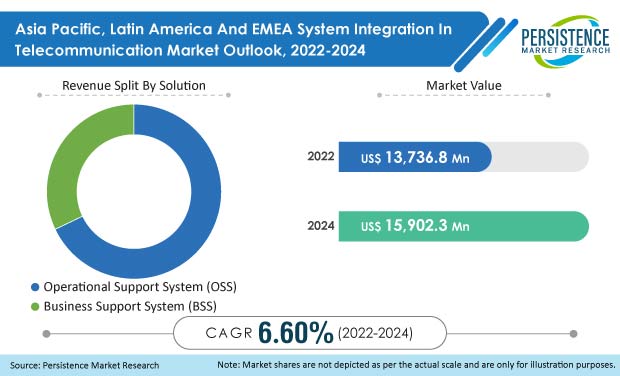System Integration in Telecommunication Market Segmented By Operational Support System, Business Support System Solution
Industry: IT and Telecommunication
Published Date: May-2022
Format: PPT*, PDF, EXCEL
Delivery Timelines: Contact Sales
Number of Pages: 164
Report ID: PMRREP14008
Demand for Asia-Pacific, Latin America, and EMEA System Integration in Telecommunication witnessed a CAGR of 7.4% between 2016 and 2021. The same market is expected to see through 6.6% CAGR between 2022 and 2024. In 2022, the global market size is expected to be US$ 13,736.8 million, which is projected to reach US$ 15,602.3 million by the year 2024.
| Attribute | Key Insights |
|---|---|
|
Asia-Pacific Latin America and EMEA System Integration in Telecommunication Market Size (2022) |
US$ 13,736.8 Mn |
|
Projected Market Value (2024) |
US$ 15,602.3 Mn |
|
Global Market Growth Rate (2022-2024) |
6.6% CAGR |
|
Share in parent market |
25% |
The Asia-Pacific Latin America and EMEA System Integration in Telecommunication Market is expected to witness a CAGR of 6.6% during the forecast period between 2022 and 2024. Because of the tremendous competition in the telecommunications sector, telecom companies are spending heavily on modernizing their existing network technologies. The increased usage of OSS and BSS solutions and the introduction of new telecommunication standards are expected to drive the growth for the Asia-Pacific, Latin America, and EMEA system integration in the telecommunication market.
Due to advancements in the telecommunications business, telecom operators (TSPs) are now providing a variety of services like video, data, internet, mobile commerce, and multimedia. Customers are increasingly requesting a complete overview of all prepaid and postpaid services. Convergent billing systems enable network operators to provide flexible rates and billing for users while also providing real-time data. The convergent billing systems offer TSPs various other benefits, like lightweight operations, the flexibility to interact with legacy systems while avoiding the high cost of BSS transition, and the opportunity to discover new income streams. As a result, these factors are projected to fuel market expansion throughout the forecast period.

The adoption of advanced telecom technologies such as 5G and LTE networks requires the integration of OSS and BSS solutions. Soon, 5G technology is expected to drive the rising demand for these solutions because it will include ultra-high-speed, on-demand data services, and intelligent systems. The transition to 5G will necessitate changes to user interfaces, connectivity, infrastructure, and operations. As a result, there will be a heavy demand for well-structured OSS/BSS platforms with better analytics, automation, and orchestration capabilities.
Fierce competition in the telecom business has resulted in service differentiation, which has become important for network operators around the globe to maintain their customer base and market presence. As a result, telecom companies are investing heavily in upgrading their traditional network systems. OSS and BSS enable telecom companies to offer services that meet the demands of their consumers and improve their customer experience. As a result, increased adoption of OSS and BSS systems is likely to boost market growth over the forecast period.
OSS and BSS systems are costly, which is a barrier to their widespread adoption by SMEs and new entrants throughout the world. These systems need modifications following new technology, which involves extra investment. Also, these systems need professional operators or a dedicated team to supervise their operations. As a result, the high costs associated with these systems are likely to restrict the market growth in the future.
“Decrease in spending on system upgrades and technological advancement.”
Many telecom firms laid off their employees due to the COVID-19 pandemic's lower business volume. Companies reduced their spending on upgrading existing systems and technological advancement throughout 2020 since they were experiencing losses. During the years 2020 and 2021, the COVID-19 epidemic slowed market growth.
Asia-Pacific, Latin America, and EMEA System Integration in Telecommunication industry is very competitive due to the presence of several large players. Due to the existence of several tech giants the market is fragmented. Key players in the market are focused on business expansion through product launches, partnerships, and collaborations to gain competitive edge and enhance the market presence.
| Attribute | Details |
|---|---|
|
Forecast Period |
2022-2024 |
|
Historical Data Available for |
2016-2021 |
|
Market Analysis |
US$ Mn/Bn for Value |
|
Key Regions Covered |
|
|
Key Countries Covered |
|
|
Key Market Segments Covered |
|
|
Key Companies Profiled |
|
|
Customization & Pricing |
Available upon Request |
Asia-Pacific, Latin America, and EMEA System Integration in Telecommunication Market by Solution
Asia-Pacific, Latin America, and EMEA System Integration in Telecommunication Market by Region
To know more about delivery timeline for this report Contact Sales

In 2022, the Asia-Pacific, Latin America, and EMEA System Integration in Telecommunication Market stands at USD 13,736.8 million, and it is expected to reach USD 15,602.3 million by 2024 at a CAGR of 6.6%.
The Asia-Pacific Latin America and EMEA System Integration in Telecommunication Market exhibited a 7.4% CAGR between 2016 and 2021.
High installation and maintenance costs are the key restraints to the Asia-Pacific, Latin America, and EMEA System Integration in Telecommunication Market.
Increasing adoption of OSS and BSS solutions, technological advancements in telecommunication network standards and •increase in the demand for convergent billing systems are the key factors driving the growth of the market.
Ericsson, Huawei Technologies Co., Ltd., Amdocs Inc., and Comptel Corporation are among the top players in the market.